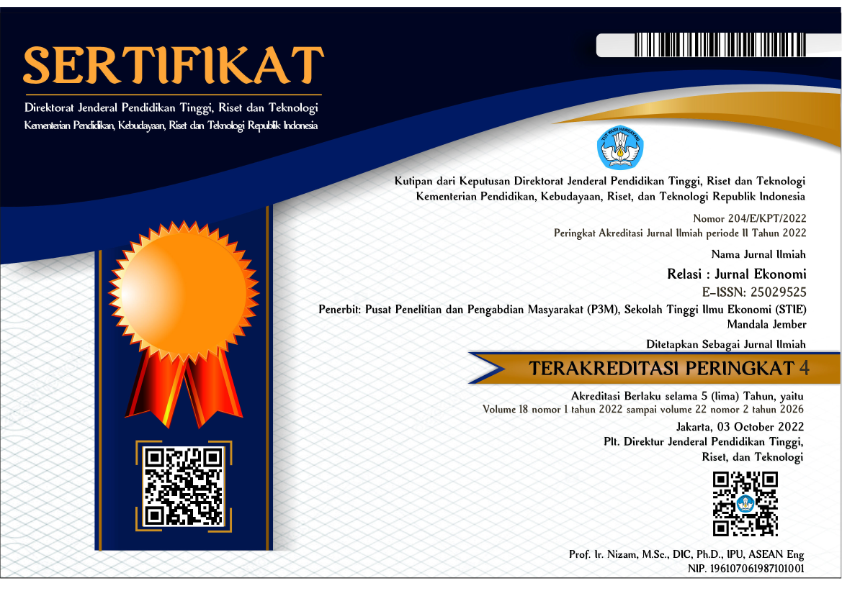Tantangan Reskilling di UMKM: Analisis Manajerial terhadap Kesenjangan Kemauan dan Kemampuan Karyawan di Era Digital
Abstract
Transformasi digital menuntut UMKM untuk melakukan reskilling guna meningkatkan daya saing dan keberlanjutan bisnis. Namun, kesenjangan antara skill (kemampuan) dan will (kemauan) karyawan menjadi tantangan utama dalam proses tersebut. Penelitian ini menggunakan pendekatan kualitatif dengan metode studi kasus pada lima UMKM sektor kuliner dan retail di wilayah Musi Rawas dan Lubuklinggau, Sumatera Selatan. Objek penelitian mencakup pemilik usaha, manajer operasional, dan karyawan. Data diperoleh melalui wawancara mendalam dan observasi terhadap praktik pelatihan serta penerapan teknologi di tempat kerja. Hasil penelitian menunjukkan bahwa keterbatasan sumber daya pelatihan, resistensi psikologis karyawan terhadap perubahan, serta kepemimpinan yang kurang responsif terhadap digitalisasi menghambat efektivitas reskilling. Oleh karena itu, dibutuhkan pendekatan manajerial yang menekankan kepemimpinan transformasional, komunikasi internal yang terbuka, serta penguatan budaya belajar. Temuan ini memberi kontribusi penting bagi pengembangan strategi SDM UMKM yang lebih adaptif terhadap perubahan digital.
References
Appelbaum, S. H., Habashy, S., Malo, J., & Shafiq, H. (2012). Back to the future: revisiting Kotter’s 1996 change model. Journal of Management Development, 31(8), 764–782. https://doi.org/10.1108/02621711211253231
Becker, F. (2019). Herzbergs Zwei-Faktoren-Theorie der Motivation. In Mitarbeiter wirksam motivieren (pp. 57–65). Springer Berlin Heidelberg. https://doi.org/10.1007/978-3-662-57838-4_8
Boyatzis, R. E. (2020). McClelland, David C. In The Wiley Encyclopedia of Personality and Individual Differences (pp. 631–635). Wiley. https://doi.org/10.1002/9781119547181.ch370
Boyatzis, R. E., Goleman, D., & Rhee, K. S. (2000). Clustering competence in emotional intelligence: Insights from the Emotional Competence Inventory. In R. Bar-On & J. D. A. Parker (Eds.), The handbook of emotional intelligence: Theory, development, assessment, and application at home, school, and in the workplace (pp. 343–362). Jossey-Bass/Wiley. (n.d.).
Chen, D., & Wang, S. (2024). Digital transformation, innovation capabilities, and servitization as drivers of ESG performance in manufacturing SMEs. Scientific Reports, 14(1), 24516. https://doi.org/10.1038/s41598-024-76416-8
Harris, S. G. (1990). The fifth discipline: The art and practice of the learning organization, by Peter Senge, New York: Doubleday/Currency, 1990. Human Resource Management, 29(3), 343–348. https://doi.org/10.1002/hrm.3930290308
Kurniaty, R., & Dewantara, R. (n.d.). Re-Evaluasi Pengaturan Mengenai Digitalisasi Usaha Mikro Kecil dan Menengah dalam Peningkatan Daya Saing di Era Ekonomi Digital. https://doi.org/10.24843/JMHU.2021.v10.i04
Laig, R. B. D., & Abocejo, F. T. (2021). Change Management Process in a Mining Company: Kotter’s 8-Step Change Model. Journal of Management, Economics, and Industrial Organization, 31–50. https://doi.org/10.31039/jomeino.2021.5.3.3
Manta, A. G., Bădîrcea, R. M., Gherțescu, C., & Manta, L. F. (2024). How Does the Nexus Between Digitalization and Banking Performance Drive Digital Transformation in Central and Eastern European Countries? Electronics, 13(22), 4383. https://doi.org/10.3390/electronics13224383
Maulana, M., Saputra, N. D., Nugraha, M., & Intan, L. N. (2022). Model Pengembangan Ekonomi Kreatif UMKM Di Kabupaten Musi Rawas Melalui Pendidikan Karakter, Knowledge Management, dan Inovasi. Sebatik, 26(2), 609–615. https://doi.org/10.46984/sebatik.v26i2.2155
McLaren, T. A. S., van der Hoorn, B., & Fein, E. C. (2023). Why Vilifying the Status Quo Can Derail a Change Effort: Kotter’s Contradiction, and Theory Adaptation. Journal of Change Management, 23(1), 93–111. https://doi.org/10.1080/14697017.2022.2137835
Michael Galanakis, & Giannis Peramatzis. (2022). Herzberg’s Motivation Theory in Workplace. Journal of Psychology Research, 12(12). https://doi.org/10.17265/2159-5542/2022.12.009
Ozsoy, E. (2019). An Empirical Test of Herzberg’s Two-Factor Motivation Theory. Marketing and Management of Innovations, 11–20. https://doi.org/10.21272/mmi.2019.1-01
Regif, S. Y., Seran, M. S., Naif, I. Y., Pattipeilohy, A., & Saputri, L. (2023). Literasi Digital Ekonomi Hijau Terhadap Pemberdayaan UMKM Desa di Kabupaten Langkat. Jurnal Ilmu Politik Dan Pemerintahan, 9(1). https://doi.org/10.37058/jipp.v9i1.6922
Rikala, P., Braun, G., Järvinen, M., Stahre, J., & Hämäläinen, R. (2024). Understanding and measuring skill gaps in Industry 4.0 — A review. Technological Forecasting and Social Change, 201, 123206. https://doi.org/10.1016/j.techfore.2024.123206
Rusdianti, I. S., Irmadariyani, R., & Kustono, A. S. (2022). E-Finance: Mitigation of Fraud Tendency in Indonesia. IJEBD International Journal Of Entrepreneurship And Business Development, 5(3), 581-589. https://doi.org/10.29138/ijebd.v5i3.1857
Vial, G. (2019). Understanding digital transformation: A review and a research agenda. The Journal of Strategic Information Systems, 28(2), 118–144. https://doi.org/10.1016/j.jsis.2019.01.003
Vina Rohmatul Ummah, Malika Risqi, Indra Lukmanul Khakim, & Muhammad Alkirom Wildan. (2025). The Impact of Reward Systems and Employee Training on Work Effectiveness Improvement in Micro, Small, and Medium Enterprises (MSMEs): A Case Study of Mie Besty. LITERACY : International Scientific Journals of Social, Education, Humanities, 4(1), 264–271. https://doi.org/10.56910/literacy.v4i1.2133
Yongfang, L. (2024). Two-Factor Theory. In The ECPH Encyclopedia of Psychology (pp. 1558–1560). Springer Nature Singapore. https://doi.org/10.1007/978-981-97-7874-4_1275
Zhang, J., & Chen, Z. (2024). Exploring Human Resource Management Digital Transformation in the Digital Age. Journal of the Knowledge Economy, 15(1), 1482–1498. https://doi.org/10.1007/s13132-023-01214-y
Zhu, X., Ge, S., & Wang, N. (2021). Digital transformation: A systematic literature review. Computers & Industrial Engineering, 162, 107774. https://doi.org/10.1016/j.cie.2021.107774
Zuñiga-Collazos, A., Galvez-Albarracin, E. J., Vera-Jaramillo, F., & Patiño-Giraldo, L. V. (2025). Digitalization, innovation, sustainability and performance: A causal analysis applied to tourism MSMEs. International Journal of Innovation Studies, 9(1), 46–59. https://doi.org/10.1016/j.ijis.2024.12.001
Copyright (c) 2025 Triono Triono, Dwi Cahyono, Nopa Dwi Saputra

This work is licensed under a Creative Commons Attribution-ShareAlike 4.0 International License.





